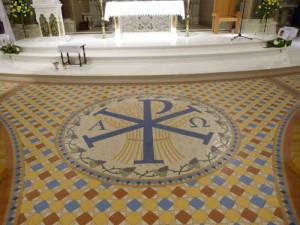
By Sarah Mac Donald - 07 October, 2013
 The Church can now invite men with the experience of married life into ministry thanks to Vatican II’s decision to restore the Permanent Diaconate, Bishop John McAreavey has said.
The Church can now invite men with the experience of married life into ministry thanks to Vatican II’s decision to restore the Permanent Diaconate, Bishop John McAreavey has said.
In his homily at the ordination Mass for the Diocese of Dromore’s first two Permanent Deacons, the Bishop described Deacons Kevin Devine and Gerry Heaney as having been blessed in their married lives.
He said Gerry from Moyraverty Parish and Kevin from St Peter’s Parish, with their wives, had been blessed with children and through the impact of their own lives had handed on their faith to their children.
“Both Kevin and Gerry have enriched the communities where they have lived and worked by their professional lives; they have also been deeply involved in their parish communities and have enriched those communities with their generous service and goodness,” Bishop McAreavey said.
Explaining how the life of every Christian is a life of service, the service of mutual love, the Bishop said the prime example of this love and service is the love of husband and wife and their love as a couple for their children.
“I never cease to be amazed at the depth and generosity of the love of couples. I see it, for example, in the care of a husband or wife when their spouse is affected by ill-health. The daily care of husband or wife for a partner in difficult circumstances puts flesh and blood on the promise they made when they got married to love one another ‘for better, for worse, in sickness and in health’,” the Bishop told the congregation gathered in St Peter’s Church, Lurgan, Co Armagh.
He said the generosity could also been seen in the impact on a couple’s life of the arrival of a new baby, “an event that brings deep joy but that impacts on their sleep, their energy, their freedom and touches them – over the years that follow – and shapes them to the very core of their being.”
He urged the two men as they received Holy Orders as deacons, to follow the example of Christ the Suffering Servant; to do the will of God generously; to serve God and all people in love and joy.
“Like the men the apostles chose for works of charity, you should be men of good reputation, be filled with wisdom and the Holy Spirit. Show before God and all people that you are above every suspicion of blame, true ministers of Christ and of God’s mysteries, men firmly rooted in faith.”
He also urged the two never to turn away from the hope which the Gospel offers; “now you must not only listen to God’s Word but also preach it. Hold the mystery of faith with a clear conscience. Express in action what you proclaim by Word of mouth,” he said.
The two men have undertaken a four-year formation programme. Kevin Devine is a teacher and Gerry Heaney is a retired teacher.
The Second Vatican Council (1962–1965) sought to restore the ministry of the diaconate. In 2005, the Irish Bishops decided to re-introduce the Permanent Diaconate and the first Permanent Deacons were ordained in Dublin in 2011.
A permanent deacon receives his mission from his bishop and is assigned to work as a member of a team under the leadership of the parish priest.
The permanent deacon is called to minister in close-collaboration with priests and with laity, who are entrusted with various ministries.
While deacons play a key role in the development and coordination of lay ministry, they are not intended to replace lay ministries.
The first responsibility of the permanent deacon is to be an effective visible sign of Christ, who came to serve rather than to be served.
Although the permanent deacons will exercise their ministry on a part-time basis, they remain at all times a deacon, and they are called in their lifestyle to reflect this.
The normal areas of ministry, which may be entrusted to deacons, can be categorised under pastoral, liturgical and faith development.
In the pastoral area it includes visiting the sick; visiting prisoners; visiting the bereaved; youth ministry; working with the poor and the homeless; promoting awareness of the social teaching of the Church; promotion of justice and human rights.
In the liturgical area, it involves proclaiming the Gospel at Mass; preaching the homily; assisting the priest at Mass (Sign of Peace and Dismissal); leading communion services, when need arises; bringing the Eucharist to the sick at home and in hospitals (nursing homes); presiding at Exposition and Benediction of the Blessed Sacrament; the celebration of baptism; celebrating marriages; presiding at funerals – (also removals, reception of remains, burials).
In relation to faith development, it involves participation in sacramental preparation programmes; formation of Ministers of the Eucharist; formation of Ministers of the Word; formation of altar servers; facilitating study of, and prayer with, the Scriptures; facilitating the development of lay ministry; chaplaincy to various parish groups and school chaplaincy.